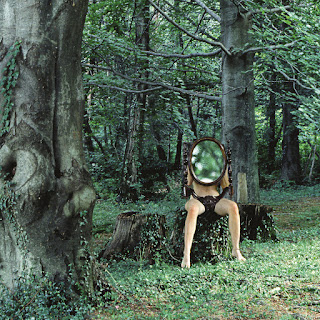When a band releases their eleventh album after almost 25 years, it’s a good opportunity to review their body of work. Kammerflimmer Kollektief’s first recording Mäander (released in 1999), is rather a weird downtempo album, launched by Thomas Weber (guitar, electronics), who started the project and has been the band’s mastermind until today. From their beginnings, the band has incessantly been developing their own musical vision. Their quest for a unique sound is recognizable on the sophomore album Incommunicando, and the fact that Johannes Frisch on double bass augmented the group proved that they were on a good way. With Dietrich Foth’s saxophone, the band also moved more in a free jazz direction, but without switching completely to this genre. Nevertheless, the dissipations and the blatant outbursts, which are still a trademark of the band today, were already laid out there. When they moved to the Staubgold label Heike Aumüller (harmonium, vocals) became part of the band and certain additional sound characteristics began to emerge. From 2010 onwards Aumüller, Weber and Frisch have formed the core of the band, and with Wildling they created a first masterpiece. The Kammerflimmer sound is fully matured here, a melange of Psychedelia, Free Jazz, Country Music elements and Dub Reggae. However, it’s important that the music is never about adaptation but about transformation. In a nutshell: a bastard you might call Free Form Ambient. Désarroi , their last album on Staubgold, is able to keep this level, being their freest one in the process. Their last release, There Are Actions Which We Have Neglected And Which Never Cease To Call Us (Bureau B, 2018), showed the band from their darker side, but still the quality level was enormously high. The question was what else could be added to this distinctive sound on a new album.
To answer the question immediately: in spite of all the continuity, quite a bit. The liner notes mention that Kammerflimmer Kollektief are aware of the fact, that every sound that comes out of guitar, bass, harmonium, percussion and electronic equipment has already been taken into the stranglehold of meaning. And the band seems to have enough of it. So, nothing has to be explained any more, which is why they speak about schemes. “Slurred“ and “Jerky“. These are exactly the name of the first two pieces that are exemplary for the whole album. “Erstes Kapitel: verschliffen“, (First Chapter: slurred), begins with two guitar chords, which are repeated constantly like in a blues song. A bass drone lurks in the background before dissolving into a riff. Layer upon layer is then piled on top of this basic structure: drums, loops, sine generator lines, the characteristic Kammerflimmer slide guitar, noises of all kinds. Even structurally, this is a typical piece for the band. At first you recognize a straightforward tune, and you get comfortable in it. But gradually you are pulled out of that comfort, gently at first, then more and more uncompromisingly. The beat loses itself almost imperceptibly, sound traces fade away, instead atonal elements push forward. Synthesizer sounds are shot into nothingness, piano chords get lost, all kinds of electronics flicker through the area. The track drags itself to the saving shore. The longer you listen to the song, the more blurred it becomes.
Then, “Zweites Kapitel: ruckartig“, (Second Chapter: jerky), also reminds us of old Kammerflimmer pieces. Heike Aumüller’s harmonium introduces softly, but the guitar is completely fragmentary (a bit Keiji-Haino-like), it’s highly distorted, while the bass refuses any kind of steadiness, before everything is jerkily pushed into another direction, which is also desolate and atonal. The consistent stylistic element of the piece is the ebb and flow of the sounds, the volume, it works with very strong contrasts. Every even brief period of rest is immediately broken up. Certainly because of its wildness the most Free-Jazz-like piece of the album.
What follows is “Drittes Kapitel: ungesagt (dann vergessen)“, (Third Chapter: unsaid, then forgotten), actually a real hit song (if there was such a thing in this genre), which redeems us from the uncomfortableness of the second piece and spoils us with a wonderful harmonic structure - only to brutally shake it in the middle of the piece with a noise passage. The shake, however, lasts only a short time. The last chapters are then rather short, but “Sechstes Kapitel: herausgewunden“ shows once again what is also new about Schemen. Christopher “Giga“ Brunner is on drums, an old companion of the band, and he contributes a lot to a varied sound. He does this by keeping a steady groove most of the time, but shifting the emphasis of the beats, which creates an underlying tension and accounts for the ambiguities, the schemes, that form the basic theme of the album.
When you allow yourself to get involved with the interlocking sounds of the Kammerflimmer Kollektief, you recognize “a free-spirited hybrid of psychoacoustic and intuitive meandering between improv parts and loops on the one hand and a song form that only almost dissolves on the other. All of it perhaps mind-bending, always hanging between precision and freedom, but without escapism“, as Weber puts it. Kammerflimmer Kollektief’s work in the studio is influenced by legendary tape collages, as known from Can, This Heat, or Soft Machine. Weber says he works as if he’s in a trance and says he doesn’t really know what he’s doing until he finally does it. It is layered and discarded again, until it fits intuitively. The great Robert Wyatt once put it very beautifully: “Soft Machine are specialized in background noise for people scheming, seducing, revolting and teaching. Cosmically heady, unconventional to a fault.“
There’s nothing more to add. Outstanding!
Schemen is available on vinyl, CD and as a download.
You can listen to the album and buy it here:
Watch Bernd Schoch’s superb video for “Drittes Kapitel [ungesagt,dann
vergessen]“:















0 comments:
Post a Comment